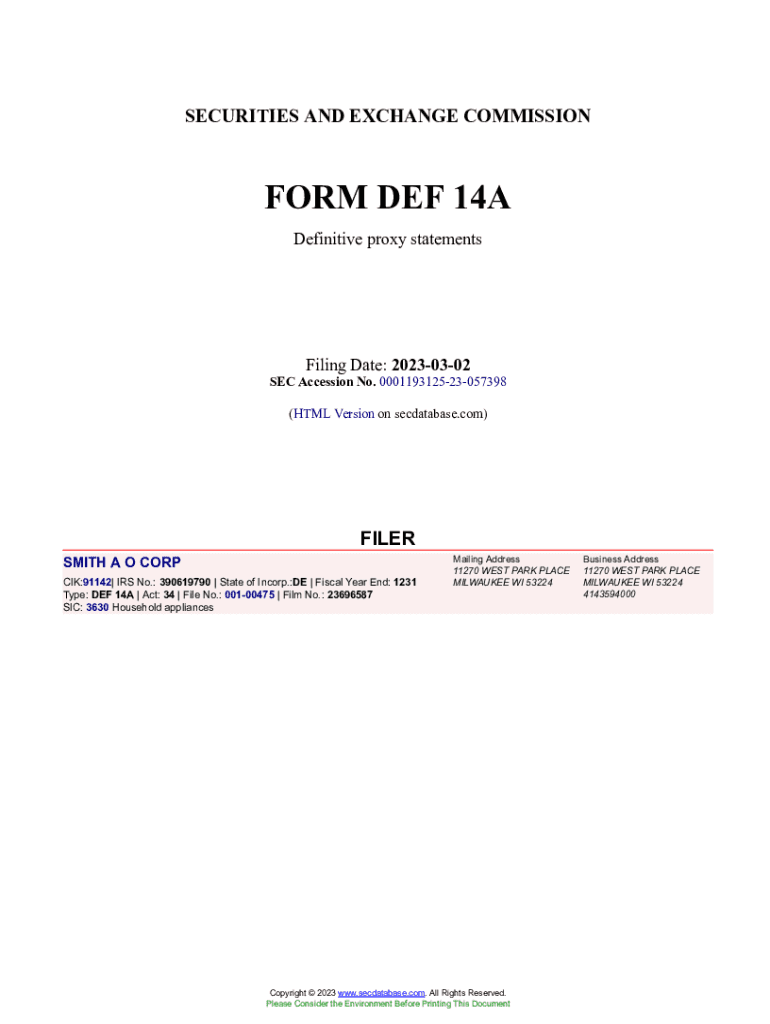SEC Requirements For Proxy Statements (Form DEF 14A)

Table of Contents
Understanding the Purpose of Form DEF 14A
Proxy statements, filed with the SEC on Form DEF 14A, serve as a critical communication tool between public companies and their shareholders. Their primary purpose is to enable shareholder voting on significant corporate matters. This ensures shareholder participation in key decisions affecting the company's future.
Public companies, including those listed on major exchanges like the NYSE or NASDAQ, are required to file Form DEF 14A. Failure to do so accurately and timely can result in significant penalties from the SEC. The importance of accurate and timely filing cannot be overstated; it's a cornerstone of good corporate governance.
- Soliciting proxies for shareholder meetings: The primary function is to solicit proxies, authorizing someone else to vote on a shareholder's behalf.
- Informing shareholders about matters up for vote: Shareholders need clear and concise information on all proposals, allowing them to make informed voting decisions. This includes mergers, acquisitions, executive compensation, and director elections.
- Providing details on director nominations and executive compensation: Transparency in these areas is vital for maintaining shareholder trust and confidence. This section should include detailed biographies of nominees, compensation packages, and any potential conflicts of interest.
- Ensuring transparency and fairness in corporate governance: Properly prepared DEF 14A filings demonstrate a commitment to ethical business practices and accountability to shareholders.
Key Components of a DEF 14A Filing
A well-prepared DEF 14A filing comprises several key sections, each containing crucial information for shareholders. Let's examine the essential components:
Information on Matters to be Voted Upon
This section details all proposals to be voted on at the upcoming shareholder meeting. This includes mergers and acquisitions, significant capital expenditures, and charter amendments. The language must be clear, concise, and free of misleading statements. Any potential conflicts of interest related to the proposals must be fully disclosed.
Information on Directors and Executive Compensation
This section provides detailed information on the company's board of directors and executive officers. It includes:
- Detailed biographies of director nominees: This should include relevant experience, qualifications, and any significant past affiliations.
- Compensation information for executive officers: This includes base salaries, bonuses, stock options, and other forms of compensation. The rationale behind the compensation structure needs clear explanation.
- Explanation of compensation structure and rationale: The company needs to justify the compensation packages, aligning them with company performance and industry standards.
- Disclosure of any golden parachutes or other significant compensation arrangements: These arrangements must be transparently disclosed to shareholders.
Shareholder Proposals
This section outlines the rules and procedures for submitting shareholder proposals. The SEC has specific guidelines regarding the inclusion of shareholder proposals in the proxy statement. The company's response to shareholder proposals must also be included.
Risk Factors and Other Disclosures
This crucial section details material risk factors that could impact the company's business and financial performance. It should include a comprehensive overview of potential risks, ensuring shareholders are fully informed. Other disclosures mandated by the SEC should also be included here. This may include information about legal proceedings, environmental issues, or other relevant matters.
Filing Deadlines and Amendments to DEF 14A
The SEC mandates strict deadlines for filing proxy statements. Late filings result in significant penalties. The exact deadlines depend on various factors, including the nature of the proposals and the company's filing history. It's crucial to consult the SEC's guidelines for precise deadlines.
If material changes occur after the initial filing, amendments to the DEF 14A must be filed promptly with the SEC. The SEC review process can involve delays, so companies should plan accordingly to allow sufficient time for review and potential revisions.
- Timely submission is critical to avoid penalties: Failing to meet deadlines can lead to significant fines and reputational damage.
- Amendments must be filed promptly if material changes occur: Any significant changes in the information initially provided must be reported to the SEC and shareholders.
- SEC review process and potential delays: The SEC may request further information or clarification, potentially leading to delays.
Best Practices for Compliance with SEC Requirements for Proxy Statements
Compliance with SEC regulations necessitates a proactive and diligent approach. Key best practices include:
- Engage experienced legal counsel specializing in securities law: Legal expertise is crucial to ensure compliance with all relevant regulations.
- Implement robust internal review procedures: Internal review helps catch errors and ensure accuracy before filing.
- Maintain thorough records of all communications related to the proxy solicitation: Detailed records are important for demonstrating compliance.
Conclusion:
Understanding the SEC requirements for proxy statements (Form DEF 14A) is essential for maintaining compliance and upholding transparency in corporate governance. By adhering to the guidelines outlined above, public companies can ensure accurate and timely filings, minimizing the risk of penalties and fostering trust with shareholders. To ensure your organization remains compliant with all relevant regulations, consult with experienced legal professionals specializing in securities law and proxy statement preparation. Don't hesitate to seek further guidance on navigating the complexities of SEC requirements for proxy statements (Form DEF 14A).

Featured Posts
-
 Tam Krwz Awr Mdah Ka Jwtwn Ka Waqeh Tfsylat Awr Wayrl Wydyw
May 17, 2025
Tam Krwz Awr Mdah Ka Jwtwn Ka Waqeh Tfsylat Awr Wayrl Wydyw
May 17, 2025 -
 Erdogan Ve Birlesik Arap Emirlikleri Devlet Baskani Telefon Konusmasi Detaylari
May 17, 2025
Erdogan Ve Birlesik Arap Emirlikleri Devlet Baskani Telefon Konusmasi Detaylari
May 17, 2025 -
 Megaloprepis Ypodoxi I Afiksi Toy Tramp Sti Saoydiki Aravia Se Eikones Kai Binteo
May 17, 2025
Megaloprepis Ypodoxi I Afiksi Toy Tramp Sti Saoydiki Aravia Se Eikones Kai Binteo
May 17, 2025 -
 Koriun Proceso De Descongelamiento De Cuentas E Informacion Para Inversionistas
May 17, 2025
Koriun Proceso De Descongelamiento De Cuentas E Informacion Para Inversionistas
May 17, 2025 -
 Misinformation About Angel Reese Identifying And Reporting False Quotes
May 17, 2025
Misinformation About Angel Reese Identifying And Reporting False Quotes
May 17, 2025
